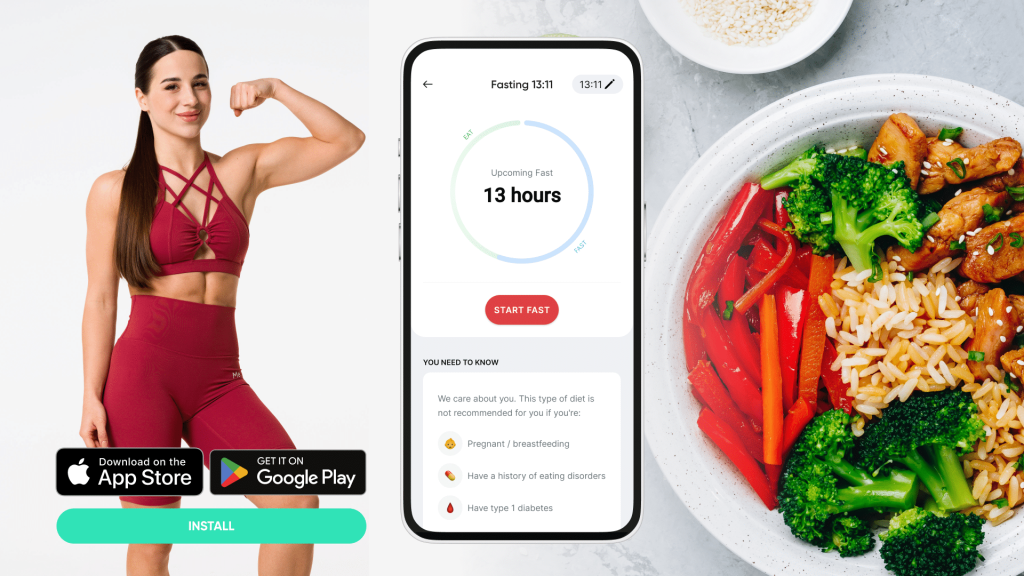An answer to the question “Does coconut oil break a fast?” can be found if you know what the rules of intermittent fasting are, how it works, and what is a coconut oil. As you may already know, intermittent fasting is an eating pattern, which can be used for weight loss or maintenance, and health improvement. The main concept of any type of intermittent fasting is that you are allowed to eat during a certain period of time, which may vary depending on your needs and preference, and completely or partially restrict your food consumption at other times (2). As a result of such restriction, your body enters the state of ketosis, when it begins to burn the deposited fat, as it doesn’t obtain any calories from food.
This nutritional philosophy does not state what you should eat, or how many calories consume. However, if your goal is to slim down, you should not expect the breathtaking result if you eat junk food and sweets during the non-fasting window. That is why, to get all the benefits from this nutrition pattern, you should still avoid refined carbs and saturated and trans fats. Make sure that you also consume all the essential nutrients, in a form of fruits and vegetables, whole grains, and lean protein (4).
Types of Intermittent Fasting
There are different types of fasting, which vary depending on the time spent without food consumption. One of the most popular types is a 16:8 plan, where your fast lasts 16 hours, and is followed by the 8-hour window when you can eat (1). There also are other types of intermittent fasting (6), such as:
-
Alternate-day fasting
The alternate-day fasting is based on the principle of eating normally one day, and then, either completely or partially (to less than 500 calories) restricting your calorie intake during the next day (7).
-
12-hour fasting
The 12-hour fasting is similar to the 16:8 plan, only here you may eat during a 12-hour window.
Read More: 12 Hour Intermittent Fasting for Weight Loss and other Benefits
-
5:2 diet
This type involves regular food consumption 5 days a week and reducing the calorie intake on 2 other days. During these 2 days, men usually consume 600 calories, and women usually consume 500 calories.
-
Eat-stop-eat diet
The eat-stop-eat diet is similar to the previous type, but it requires avoiding consuming any food during one or two days a week.
-
The warrior diet
The warrior diet states that you are allowed to consume food in very small amounts during a 20-hour fasting period, and then have your full meal during a 4-hour eating window (3).
If you struggle to even flirt with the idea of giving up your favorite foods or working out till your legs give way – BetterMe app is here to breathe a fresh perspective into the way you view the weight loss process! Check out the app and experience the fun side of fitness and dieting with BetterMe!
Nutritional value of coconut oil
Now that you know what the requirements of intermittent fasting are, you need to find out what the nutritional value of coconut oil is, to answer the question “Does coconut oil break a fast?”.
The problem with coconut oil lies in its supposed healthiness. Although it is quite rich in medium-chain triglycerides (MCTs) which have proven to be beneficial for health, the studies that proved such effects did not use the coconut oil itself, but a 100% MCTs oil. So, in order to reach the beneficial result of the MCTs oil, you will have to consume an unhealthy amount of coconut oil, which consists of more than 80% saturated fats. Consumption of saturated fat should be reduced to less than 10% of your daily calorie intake, if you want to have a healthy body and lose weight (8).
A tablespoon (13.6g) of coconut oil contains (5):
- 121 kcal
- 0g protein
- 13.5g fats, of which 11.2g are saturated
- 0g carbs
As you can see, coconut oil is quite high in calories and should be consumed in moderation. Despite the relatively high content of MCTs in it, there is not enough evidence about its health benefits. That is why experts recommend treating it as any other saturated fat, and reduce its consumption.
Does Coconut Oil Break a Fast?
Someone may think that a couple of drops of coconut oil is not that high in calories. Unfortunately, it is not the case when it comes to intermittent fasting.
If you are determined to fast properly, you need to admit that coconut oil is different from tea or coffee (which are also often under the question), and should be excluded from your ration during a fasting period, the same way, as all the other oils and foods in general. However, there are certain cases when you can allow yourself some coconut oil in the coffee during the fast. For example, if you stick to the rules of the warrior diet, alternate-day fasting, or the 5:2 diet. They do not completely restrict the consumption of food during a fast, allowing you to consume low-calorie foods. But even then, you still better substitute a tablespoon of coconut oil which will make up almost 25% of your 500 daily calories, with fruits and vegetables which will provide you with vital nutrients.
However, if you follow an eat-stop-eat diet, 16:8 or 12-hour fasting, you should only drink water during your fast. Even one drop of coconut oil may, although not completely, break the fast because of its high calorie content.
The Bottom Line
Intermittent fasting has gained a lot of new followers these days. Although some people call it a diet, it actually is an eating pattern. It doesn’t require or restrict the type of food or the number of calories that you consume, rather recommends at which times you should eat. There are different types of intermittent fasting, depending on the duration of fasting. Although it doesn’t have strict rules about what food you should eat or exclude, it clearly states that you should not eat anything during your fasting period, unless you follow a certain type of fasting, which allows eating a restricted amount of food during the day.
As coconut oil is far from being calorie-free, and for the most part consists of saturated fats, its consumption during the stricter, no-calorie fast can break it. However, in small amounts, it won’t cancel all the benefits from fasting. So, it is up to you, whether to include it into your ration, or not. But if you are going to break a fast anyway, then you should better do it by eating something that will be less calorie-rich and promote better health. Remember that your wellness is your number one priority. If you feel like you should make any adjustments in your current nutritional plan, please, consult a specialist. Supplement your diet with some exercise to double your results.
DISCLAIMER:
This article is intended for general informational purposes only and does not serve to address individual circumstances. It is not a substitute for professional advice or help and should not be relied on for making any kind of decision-making. Any action taken as a direct or indirect result of the information in this article is entirely at your own risk and is your sole responsibility.
BetterMe, its content staff, and its medical advisors accept no responsibility for inaccuracies, errors, misstatements, inconsistencies, or omissions and specifically disclaim any liability, loss or risk, personal, professional or otherwise, which may be incurred as a consequence, directly or indirectly, of the use and/or application of any content.
You should always seek the advice of your physician or other qualified health provider with any questions you may have regarding a medical condition or your specific situation. Never disregard professional medical advice or delay seeking it because of BetterMe content. If you suspect or think you may have a medical emergency, call your doctor.
SOURCES:
- A guide to 16:8 intermittent fasting (2020, medicalnewstoday.com)
- Fasting: What You Should Know (2018, webmd.com)
- How to begin intermittent fasting (2019, medicalnewstoday.com)
- Mayo Clinic Minute: Is intermittent fasting healthful or harmful? (2018, newsnetwork.mayoclinic.org)
- Oil, coconut (2019, fdc.nal.usda.gov)
- Seven ways to do intermittent fasting (2020, medicalnewstoday.com)
- What is intermittent fasting? Does it have health benefits? (2020, mayoclinic.org)
- What to know about coconut oil (2019, medicalnewstoday.com)









